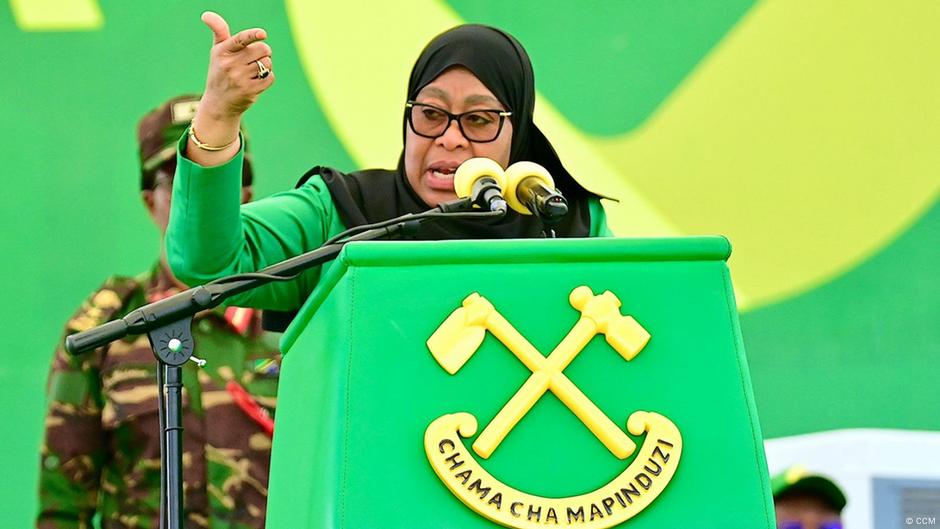Dar es Salaam resident Esther Kasanga is one of many Tanzanians with clear expectations as voters prepare for the October 29 general election.
“Whoever is the leader who is elected, I hope they will prioritize the needs of the people – especially women, youth and persons with disabilities,” Kasanga told DW.
Since its establishment in 1977, Tanzania’s ruling Chama Cha Mapinduzi (CCM) has dominated the political landscape in the East African nation, making it Africa’s longest continuously ruling political party.
Economist Bravius Kahyoza said that in many developing countries, economies often react to how elections are handled, with political tensions leading to shocks. “It is therefore important for national leaders to handle such moments wisely,” he said.
According to Kahyoza, Tanzania’s political and economic environment remains relatively stable, indicating the possibility of peaceful elections and continued economic stability thereafter.
“The economy runs on confidence, and currently, that confidence appears solid. While full assessments come after the elections, indicators look positive,” he said. Economic growth is above 5%Inflation is largely stable.
3 types of voters in Tanzania
According to political analyst Paternus Niagira, there are three different types of voters in the electoral landscape.
“The first group is made up of the ruling party, the CCM, and its supporters, who are largely optimistic about both the electoral process and the expected outcome,” he said.
Then, there are also supporters of the opposition Chadema and ACT-Wazalendo parties. “This group largely believes that the election process lacks fairness and transparency,” he said.
Niegira has identified a third group emerging primarily from social media circles, which is calling for nationwide demonstrations on 29 October. “This particular group has recently increased tensions in the country,” he said.
The government has condemned the planned opposition protests, stressing the need for peace and order. Meanwhile, the army is assuring the public that the country is peaceful and stable.
Despite this, according to Niagira, there is uncertainty among citizens, many of whom are unsure what may happen on election day.
Voters care about health
“Women still face many challenges in accessing quality care,” said Dar es Salaam resident Cairo Mwisraeli. “The current administration has made progress, but much more needs to be done – including building health centers closer to communities.”
According to the Africa Centers for Disease Control and Prevention, Tanzania has achieved an 80% reduction in maternal mortality within seven years – from 556 deaths per 100,000 live births in 2016 to 104 in 2022. However, despite these remarkable achievements, some challenges remain.
“I wish the next president would pay more attention to private hospitals,” said Filipina Shayo, one of the women who experienced and witnessed challenges within Tanzania’s health care system.
“Many private facilities operate with little oversight. Sometimes, women who need medical services are left waiting for help that doesn’t exist. We hope the incoming administration will prioritize better oversight – from ensuring proper diagnosis to ensuring hospitals have enough specialists available.”
Need for educational reforms
“My wish for the next president is to make major reforms in education,” said David Ndunguru, another resident of Dar es Salaam. “We need a curriculum that is in line with today’s global realities and directly linked to the job market. The welfare of teachers should also be a priority.”
Resident Tobias Masalu said the current educational model is failing citizens to support their economic, social and political well-being and even limiting their freedom of expression.
He observed that this system produces students who are unable to become critical thinkers about their country, rendering them unable to effectively utilize the available national resources. He emphasizes that these important changes should not remain abstract policies, but should be actively implemented.
According to Tanzania’s National Bureau of Statistics, 83% of the population is literate.
empowering youth
Daniel Musashi said, “I hope the next president will focus on youth empowerment – especially by supporting small-scale businesses.”
Government-led youth empowerment programs in Tanzania focus on vocational training, entrepreneurship and leadership through initiatives such as the National Youth Development Policy and the National Youth Development Fund. These initiatives collaborate with the private sector and NGOs to provide essential credit and skills training, with the goal of generating employment and promoting youth-led businesses.
“It is important for us as a country to invest more in digital matters and to be able to produce graduates equipped with skills in various sectors, especially agriculture, technology and business,” Ndunguru stressed. He said that despite changes in education, a lot of work still needs to be done.
According to the Policy Forum, a network of over 60 Tanzanian civil society organizations, unemployment remains a serious challenge for both educated and uneducated youth in Tanzania. While the overall unemployment rate is 4.1%, it remains high among youth (11.7%). Women face a seriously high rate of unemployment at 14.6%, while men face a rate of 8.9%.
Edited by: Benita Van Eysen and C. Mavakideau






Leave a Reply